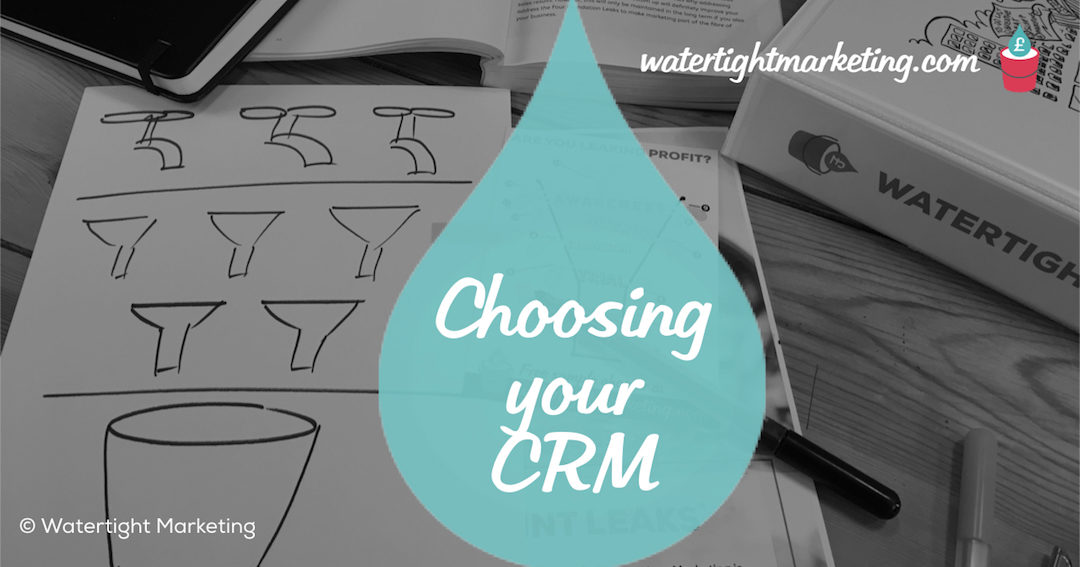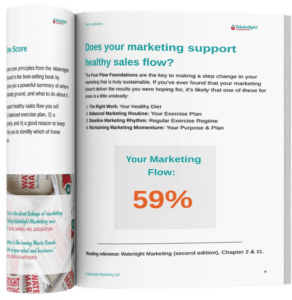I am continually asked how to choose CRM for small business. Our clients are typically step-up businesses. That is, they are onto some thing and they now want to scale it up. At some point in this journey their data needs and automation desires mean that minds turn to Customer Relationship Management. For most people, this means software. Certified Practitioner, Peter Baynes, explains why it is so much more than this. ~ Bryony Thomas
If you read any marketing blog or article, it won’t be long before you come across one about the importance of data in marketing. ‘Big data’ has become quite a common term to describe the vast increase in the data that is available. From website analytics, on-page behaviour, email interactions, social media engagement, to good old-fashioned contact details… there’s a lot of information to manage. Oh, and let’s not forget, marketing automation.
So what is CRM anyway?
Before you go about choosing CRM for your small business, you first need to define it. CRM stands for ‘customer relationship management’. Now there are other acronyms – MRM – ‘membership relationship management’ (for membership bodies) SRM ‘Supporter or stakeholder relationship management’ (for not for profits and charities). Basically, it is a system that helps you manage your relationship with those people.
It is not always or exclusively customers. Keep in mind all the other stakeholders – partners, distributors, employers, suppliers. And, of course, people who are not yet customers. What do you need to manage these relationships well? You need to start with data…
The ‘Big Data’ explosion…
Marketers are describing this explosion in data with the 4 V’s:
- Volume is just the huge amount that is now available to a business
- Velocity is the speed at which it is available – we instantly know if someone opens an email or likes a LinkedIn post
- Variety refers to the huge variety of data available – from web analytics, social media posts, email marketing software- not just hard facts and figures, but opinions and emojis.
- Veracity considers the trustworthiness or reliability of the data , and how much importance should we attach to it.
But what data does your growing business need?
Identifying the data of value to your business…
You will already use some data to run and manage your business – not least the end of month financial figures. Beyond this, it is always worth asking:
- How much and what data do you actually need?
- Is too much data bad for you? Does analysing it eat more time than the value it gives you?
- What is the most important data that you should be focusing on?
Gathering, storing, analysing, interpreting and managing data is time-consuming and costly. So, it’s essential that you focus your efforts on the data that most valuable to you, and your business. This is the fifth and most important V, value, as recognised by Bernard Marr in his post “Why only one of the 5 V’s of big data really matters”.
Valuable data is data that informs great decisions. Recognising which is the valuable data from amongst all that is available, is the key element for when you come to decide on what CRM you need.
It’s all about managing relationships
At the centre of any CRM system is a database. You will need to store:
- Contact details & permissions, including the organisation within a B2B context.
- Interactions you’ve had with people.
- Entities, these are campaigns, events or opportunities to which contacts are attached.
When is comes to interactions, this increasingly involves managing various processes, or workflows – a series of activities that are required to complete an outcome. Automation helps you to run these processes without manual intervention. For example, consider how you might send a proposal to a client – to do this you need their contact details, some information about their business and needs, a record of their response, and a task to remind you to follow-up. If this turns into a sale, this may require integration with and sharing of data between other systems, such as accounting systems or stock control systems
You will want to report at different levels:
- Tactical: e.g. campaign performance, open rates, individual salesperson activity.
- Management: e.g. pipeline reporting to forecast sales and keep on track.
- Strategic: e.g. dashboard reporting of key performance indicators with variance against plans.
You can see that there are many moving parts, and lots of tasks to complete.
Choosing CRM for small business is something you treat with as much care as selecting and managing a key member of staff.
Thinking of CRM as a member of the team should also give you a clue as to how long it takes to bed in and deliver results. Just as you would not expect just getting ‘another pair of hands’ in your business to magically solve your problems, you should not expect just buying a CRM will suddenly transform your business. If you view CRM as an approach, rather than a piece of software, you will be in much a better position to make it work for you.
Three key considerations when choosing CRM for small business
Considering the above, it essentially boils down to deciding:
- WHO we need to store data about – the contact management function of CRM
- WHAT key processes you want to manage – the workflow management aspect of CRM
- HOW you want to measure and track your activities – the reporting function of CRM
For the WHO, it’s not just information about prospects and customers. You also need to consider what information you need about those who our prospects and customers turn to: the influencers, the referrers, the decision makers and the users. This is ‘Their Team = Your Audiences’ part of the Watertight Marketing Framework (Chapter 5 of Watertight Marketing).
For the WHAT, you need to know what the key steps are that our prospects take to becoming loyal customers, and how you serve them in those steps, and that requires understanding of the six tasks of marketing, and the Touchpoint Leaks (Chapters 1 and 2 of Watertight Marketing).
For the HOW, you need to consider not only what you measure, but how you do it and how you interpret is. You need make sure you are measuring over the right timeframe and know the difference between an indicator and an outcome, as described in ‘Mindful Marketing Measurement’ (Chapter 10 of Watertight Marketing).
If you seriously consider these issues, then you will not only have a sound outline of your CRM requirements, you will also define the data that is valuable to you. This will be the data that helps you understand your customers and your business, and helps you make confident decisions to ensure your business grows.

Peter Baynes
Watertight Marketing Certified Practitioner
Peter is an experienced B2B marketing consultant with a strength is supporting high-growth technology businesses. He is based in Surrey and supports clients across the South East.



Thank you for such a valuable article on the benefits of using a CRM system for small businesses. A CRM system can help you streamline your sales and marketing efforts, improve customer relationships, and drive growth. Here are some actionable tips to help you get started:
Identify your business needs: Before you select a CRM system, it’s important to understand what your business needs and what you hope to achieve with the system.
Choose the right system: There are many CRM systems available, so it’s important to choose one that fits your business needs and budget. Consider factors such as scalability, integrations, and user-friendliness.
Implement a data migration plan: If you’re switching from an old CRM system, it’s important to have a plan in place for migrating your data to the new system. This will help ensure that your data is accurate and up-to-date.
Provide training: Make sure that your employees are trained on how to use the CRM system effectively. This will help ensure that the system is being used to its full potential and that everyone is on the same page.
Customize the system to fit your needs: Most CRM systems are highly customizable, so it’s important to take advantage of this to make sure the system fits your specific needs and processes.
Continuously monitor and adjust: Regularly monitoring your CRM system and making adjustments as needed can help you get the most out of the system and continuously improve your sales and marketing efforts.
I hope these tips help you get started with using a CRM system for your small business. Good luck with your efforts!